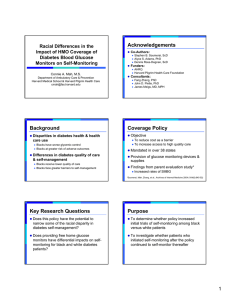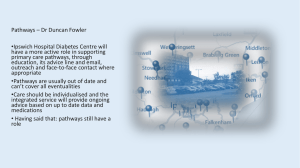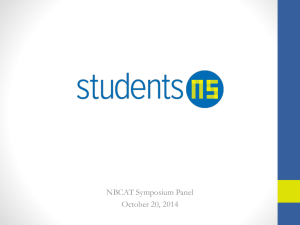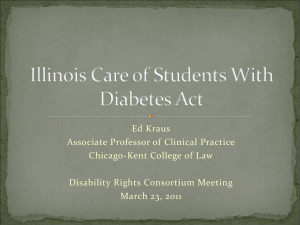Presentation
advertisement
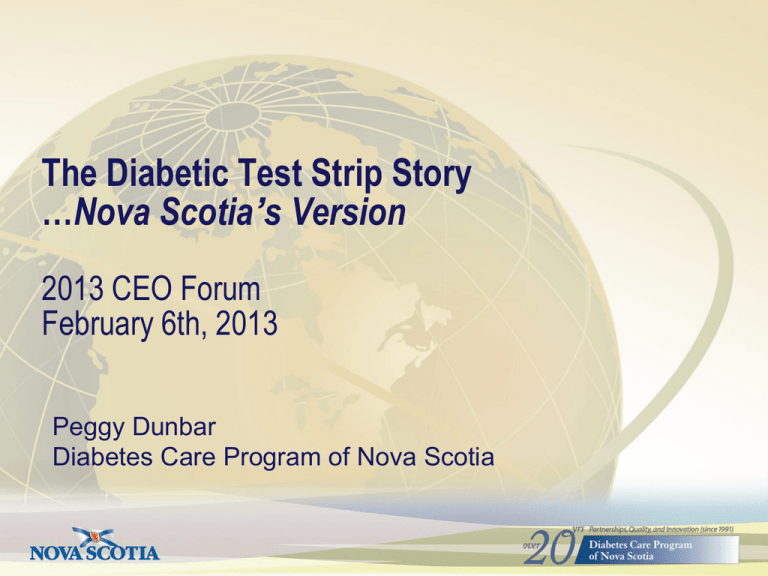
The Diabetic Test Strip Story …Nova Scotia’s Version 2013 CEO Forum February 6th, 2013 Peggy Dunbar Diabetes Care Program of Nova Scotia Alan Cassels Drug policy researcher, University of Victoria Diabetes: Profits Before Evidence Posted: 06/11/11 09:47 AM ET The Huffington Post A year ago, Nova Scotia decided it was going to try to put a stop to the waste and harm caused by the overuse of diabetes test strips and capped the number of strips it would cover for non-insulin-dependent diabetics. This sounded like a reasonable thing to do and I admired their pluck. This is our story… Setting the Stage • Diabetes is a significant and growing concern – 10-12% in the 20+ population; 25-30% in the 75+ – ~ 20-25% with prediabetes in the 45-75 yr. age • Approaches to management vary by diabetes type and treatment – Insulin/pumps to lifestyle only • Some approaches are more efficacious than others • The management demands placed on people with diabetes are overwhelming • Diabetes management should focus on patient self-care and those aspects of care that have proven efficacy Ours is not the only story…. SMBG Café Scientifique events hosted in 12 cities SMBG presented as topic during hospital rounds at Whitehorse General CME session through Wednesday @ Noon webinar program hosted by Memorial University SMBG presentations and workshops at conferences throughout Canada Guidebook for DM Management in LTC to be released in 2013. Launched “Test With Purpose” – a knowledge translation campaign to educate providers and patients. RxFiles (academic detailing program) disseminating SMBG information NB Diabetes Strategy Bulletin, distributed to more than 1,200 physicians, highlights CADTH’s work on SMBG Academic detailing service in 2010 (though Dalhousie University) and ongoing CM&PE through Deans. Nine nursing homes adjusted SMBG schedules to monthly testing. DCPNS LTC Guidelines address SMBG CADTH Key Messages People with T1DM using basal-bolus (long- and short-acting) insulin regimens Self-monitoring of blood glucose (SMBG) should be individualized. Adults with T2DM using insulin SMBG should be individualized, up to 14x per week is sufficient for most of these patients. Adults with T2DM managed on oral antidiabetes drugs CADTH. Optimal Therapy Report – COMPUS. 2009;3(7). Adults with T2DM controlled by diet alone *For most patients Routine selfmonitoring of blood glucose is not required.* Cost Considerations—Individual and System… Canada public and private drug plans, 2006 • BG test strips > $330 Million • BG test strips in top 5 classes of total expenditures • Costs exceed all oral antidiabetes drugs combined Nova Scotia Pharmacare program, 2008: • Diabetes medications $8,532,000 • Glucose test strips $8,522,200 o > $4,000,000 (oral antidiabetes drugs or no drugs) o $870,000 no diabetes drugs on file Ref. CADTH. Optimal Therapy Report – COMPUS. 2009;3(4). CADTH. Optimal Therapy Report – COMPUS. 2009;3(2). PHAC. Diabetes in Canada – Facts and Figures. 2008. CDA. The prevalence and cost of diabetes. 2008. NS Pharmacare Program Provider Approaches…variability between and within provider groups Self-Monitoring of Blood Glucose (SMBG): What are Healthcare Professionals Recommending?* Faculty of Medicine, Dalhousie University – Family Medicine Qualitative Study: Interviews of Physicians, Pharmacists, Diabetes Educators to determine: 1. Recommendations for SMBG in well-controlled adults (A1c ≤ 7.0%) with T2DM (lifestyle only and oral agents) 2. Use of SMBG results 3. Sources of information for SMBG recommendations Findings: Variable results between and within provider groups—for frequency (< 1 to 4 x/day) and timing (ac/pc/random) *Latter C., McLean-Veysey P, Dunbar P, Frail D, Sketris I, Putnam W. Self-Monitoring of Blood Glucose: What Are Healthcare Professionals Recommending? Can J Diabetes 2011;35(1):31-38 Summary Messages • Most adults not using insulin don’t have to test as much as they currently do – Lack of high quality evidence in Type 2 DM not using insulin – No clinically relevant improvement in BG control or patient well-being – Lack of hard outcomes; i.e., mortality – Insufficient evidence to determine optimal frequency of SMBG • SMBG should be used when linked to specific patient actions such as: – Treatment of hypoglycemia and/or self-directed medication dosage adjustment • Substantial spending • Inconsistency among and between health care providers • Focus on collaborative efforts and educational initiatives to modify approach to SMBG in Nova Scotia across settings & provider groups Nova Scotia Partnership Activities DCPNS SMBG Working Group (07/2009) CADTH: COMPUS Report Released (06/09) DCPNS SMBG Working Group/Workshop • Consensus Development (01/2010) Provider Decision Tool Development Café Scientifique: • Public • Providers (02/10) DCPNS Provincial Workshop—DEs) Academic Detailing—MDs & DEs DEANS Nova Scotia Policy • Feb. 26 2010, 100 strips/yr (Non-In) • Early March, 2010 recalled • ? 1212 policy Academic Detailing Rx—Pharmacists) Videos Development (1 & 2) Inter-professional Workshops (Community-based) 02/2011…. Other efforts Features of the Decision Tool Can be used to guide, and focus, group discussion and individual decision. Provides: •indications for testing (who should test—safety issues). • required conditions for testing (use of results by provider/pt). •examples of low and high intensity testing and reinforces the need for “time limited” testing. And, addresses the role of self-management education (if you feel someone just needs to test). Supported by two videos (YouTube link): 1. Background rationale (clinical champions) 2. “How to use” with applied case studies What We’ve Learned • A multipronged approach, continuing over time, and Clinical champions are essential • Providers are making changes – – – – Fewer patients are coming in with meters Doctors are suggesting testing less Letters from Diabetes Educators indicate less testing We ask “how are you today”, rather than “show me your book/meter results” • Patients welcome the change – “My fingers will thank you” – Those choosing to test, are testing less “We need to do a better job earlier with physicians and others--“how to say no” to unfounded practice and to play more of an advocacy role in the change process.” Kevin McNamara, Deputy Minister of NS DHW In Closing … are we guilty of “treatment creep” in teaching people with type 2 diabetes who do not require insulin about SMBG? – We must convince leaders in healthcare settings to abandon the use of SMBG as a measure of quality in clinical care – Savings in public funding for strips can be diverted to human resources to encourage behaviour modification to achieve optimum glycemic control. Editorial commentary by Dr. Heather J. Dean Can J Diabetes 2011;35:19-20 Acknowledgments & Special Thanks Partners/collaborators • Dalhousie University: - Divisions of Continuing Medical and Pharmacy Education - Academic Detailing • The Drug Evaluation Unit, Capital Health • Nova Scotia DHW/DEANS (The Drug Evaluation Alliance of NS) • The Diabetes Care Program of Nova Scotia: - “Champions for Change”- participants and attending observers of the DCPNS SMBG Workshop and reviewers of the “decision-tool” • CADTH (national and local representatives) • Nova Scotia PATH Program (focus on the frail elderly)
